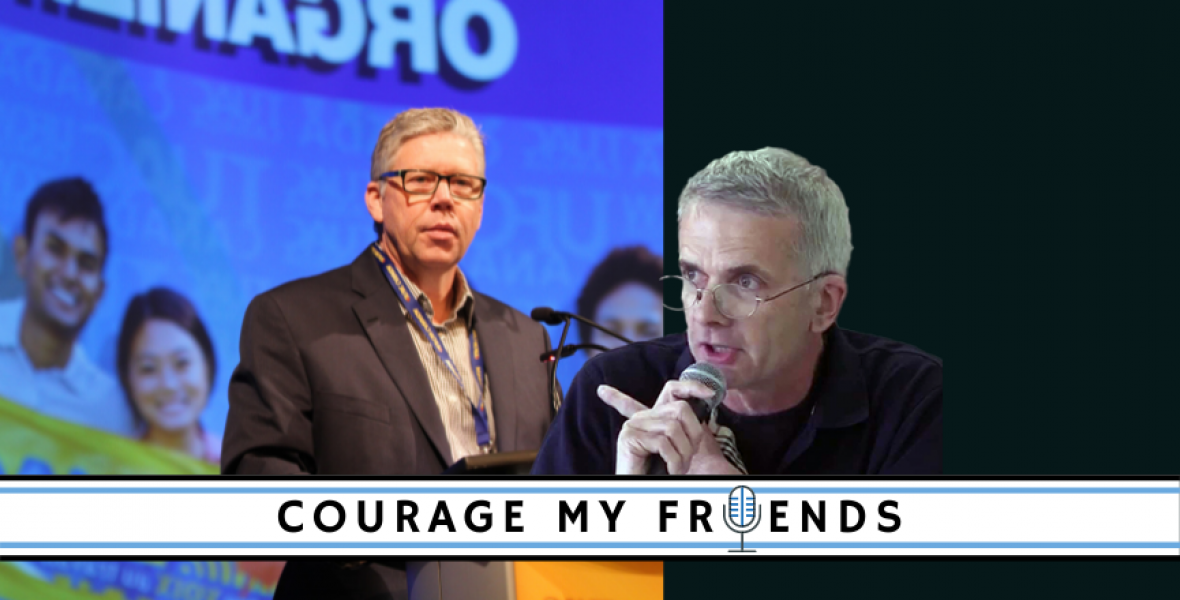In episode two of the Courage My Friends podcast, we are joined by anti-poverty activist and former organizer with the Ontario Coalition Against Poverty, John Clarke and Paul Meinema, national president of United Food and Commercial Workers (UFCW), representing essential workers including “food workers from field to fork.”
Clarke and Meinema discuss the ways in which this pandemic has forced us to confront what Clarke sees as a “crisis in capitalism” — its path forged well before the arrival of COVID. John Clarke says “As the pandemic is unleashed in the neoliberal world, the virus literally followed the trail that was laid down for it by the whole neoliberal reordering of the workforce, and the neoliberal reordering of societies…. In a thousand ways, the neoliberal society and the neoliberal city created a route for the pandemic to go down.”
Decades of mounting inequality has been a defining outcome of neoliberalism. The impacts of this inequality have been disproportionately endured by our most vulnerable — poor and largely racialized communities and front-line workers who have always been essential, but until COVID largely invisible.
As Meinema describes them: “Workers that we’ve looked past… when you go into a grocery store, or retail store, or often a person who’s cleaning your hotel room … They’re almost invisible people. But they’re the people that we are relying on now, to get us through this.”
And here we are in what Clarke sees as, “a situation of really unprecedented economic dislocation, unprecedented suffering. And clearly, governments were not prepared for this crisis. And governments have not responded to this crisis in a way that meets people’s needs.”
Are we continuing to meet an unpredictable pandemic with predictable policy responses — the kind of thinking that paved the way for this crisis in the first place? How can we designate workers as essential and yet treat them as though they are expendable?
According to Clarke, “It’s sometimes been regarded as hyperbole to say that the corporate profits are worth more than human life. But I think this pandemic and the experience of the pandemic has actually demonstrated that very, very, very starkly. ..here has been a readiness to abandon people, a readiness to, if you’d like, sacrifice people.”
What is the way forward? Can we move from banging pots to making policies that support our most vulnerable? Can we find an answer in a universal basic income? What is the role of unions? What about our communities?
As we move toward a post-pandemic (but still perhaps pre-pandemic) world, is it possible to release ourselves from exploitative economies?
Meinema reminds us that, “we cannot let any of these things that have occurred to us slip through our fingers and not remember them.” What lessons do we take with us into the future?
Can the post-pandemic world also be a post-poverty world?
Host and co-producer Resh Budhu begins the conversation with a focus on the most critical issues facing vulnerable communities and front-line workers in this moment of crisis.
About today’s guests:
John Clarke became involved in anti-poverty organizing in the 1980s, when he helped to form a union of unemployed workers in London, Ontario. In 1990, he moved to Toronto to become an organizer with the Ontario Coalition Against Poverty and stayed in this role until 2019. He is presently Packer Visitor in Social Justice at York University.
Paul Meinema is the national president of United Food and Commercial Workers Canada (UFCW), the country’s leading and most progressive private sector union with more than 250,000 members. He is also an executive vice-president of the UFCW International Union and a member of the UFCW International Executive Committee. Paul’s service with UFCW spans four decades, beginning in the 1980s when he first volunteered to serve his co-workers as a shop steward while working on the floor at the Fletcher’s meat processing plant in Red Deer, Alberta. Paul also serves as Canadian sector representative on the board of directors of the International Foundation of Benefits, and as a trustee of various UFCW Canada benefit and pension plans.
Transcript of this episode can be accessed at georgebrown.ca/TommyDouglasInstitute
Images: John Clarke and Paul Meinema. Used with Permission
Music: Ang Kahora. Lynne, Bjorn. Rights Purchased
Intro Voices: Chandra Budhu (General Intro./Outro.), Miriam Roopanram, Sharon Russell Julian Wee Tom (Street Voices); Bob Luker (Tommy Douglas quote)
Courage My Friends Podcast Organizing Committee: Resh Budhu, Victoria Fenner (for rabble.ca), Ashley Booth, Chandra Budhu, John Caffery, Michael Long
Produced by Resh Budhu, Tommy Douglas Institute and Victoria Fenner, rabble.ca
Host: Resh Budhu
A co-production of the Tommy Douglas Institute, George Brown College, Toronto, and rabble.ca with the support of the Douglas Coldwell Foundation.



